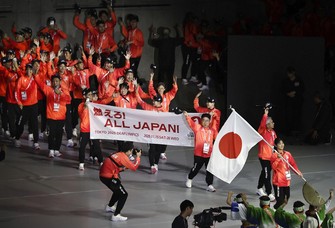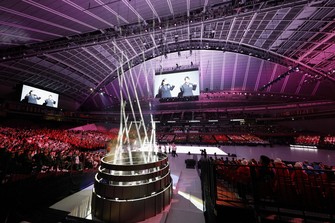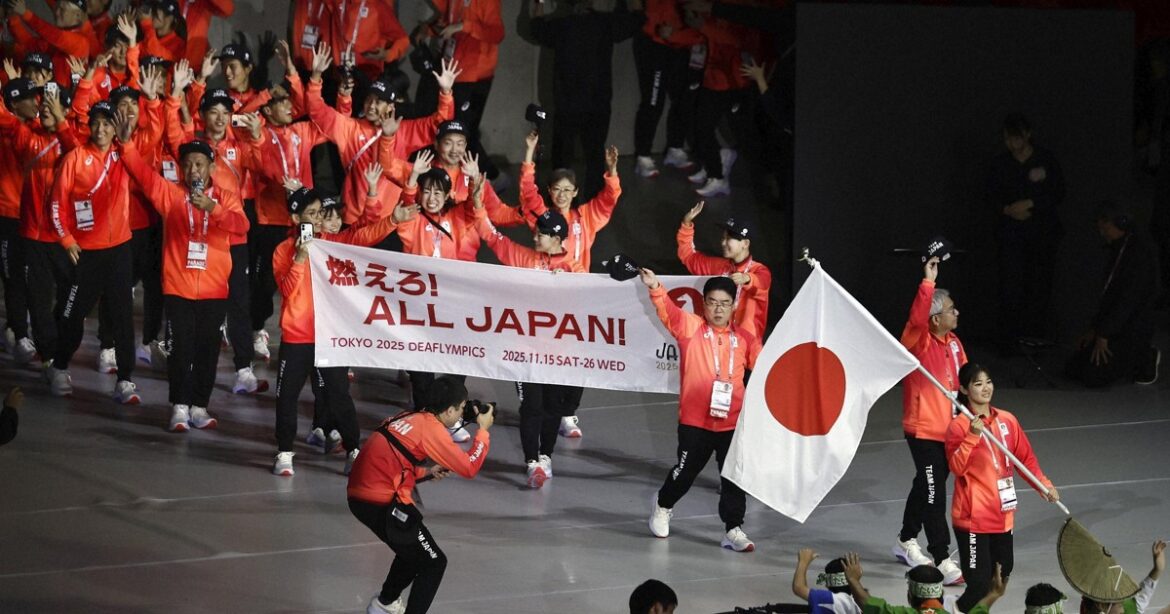
Athletes representing Japan make their entrance at opening ceremony of the Tokyo Deaflympics, with karateka Ryo Ogura as the country’s flagbearer, at the Tokyo Metropolitan Gymnasium on Nov. 15, 2025. (Kyodo)
TOKYO (Kyodo) — The Deaflympics officially opened Saturday in Tokyo, marking the first time Japan has hosted the international sporting event for the deaf or hard of hearing.
A record 3,081 athletes from 81 countries and regions, as well as a refugee team and a neutral team competing under the Deaflympics flag, have made the final entry list for the games, with the opening ceremony held at the Tokyo Metropolitan Gymnasium in the heart of the Japanese capital.
“We have used the Tokyo 2025 Deaflympics as an opportunity to advance understanding of deafness, sign language, deaf sports and barrier-free communication throughout Japan,” Daigo Ishibashi, president of the Japanese Federation of the Deaf, said in his speech.
Attendees included Crown Prince Fumihito, the younger brother of Emperor Naruhito, along with Crown Princess Kiko and their two children, Princess Kako and Prince Hisahito, who is second-in-line to the throne.
“I hope that the Tokyo Deaflympics will create cherished memories for many people and will build momentum for even greater interest in deaf sport,” the crown prince said in his address.
Also in attendance were Japanese Prime Minister Sanae Takaichi and Tokyo Gov. Yuriko Koike, while Adam Kosa, president of the International Committee of Sports for the Deaf, declared the games open.
This year marks 101 years since the first Deaflympics were held in Paris in 1924, with hopes the event will help deepen understanding of deaf people and sign language and lead to a more inclusive society.

The opening ceremony for the Tokyo Deaflympics is pictured at the Tokyo Metropolitan Gymnasium on Nov. 15, 2025. (Kyodo)
It is the first time Japan has hosted a major international multi-sport event since the Tokyo Olympics and Paralympics in 2021.
The event, running through Nov. 26, features 21 sports and 209 events.
A key requirement for participation is having hearing loss equivalent to being unable to hear speech at 55 decibels. Hearing aids are prohibited during events to ensure fairness.
Japan’s 2025 delegation is its largest ever, with approximately 270 athletes. The host nation aims to exceed its previous record from the 2022 games in Caxias do Sul, Brazil, and win over 31 medals.
Japan’s flagbearer Ryo Ogura, 25, who works at a special needs school in Saitama Prefecture, neighboring Tokyo, aims to win two gold medals in women’s karate.
Competitions also took place on Saturday ahead of the opening ceremony, including sports not featured in the Olympics and Paralympics such as orienteering, in which athletes use maps and compasses to navigate a course and reach set checkpoints.


AloJapan.com